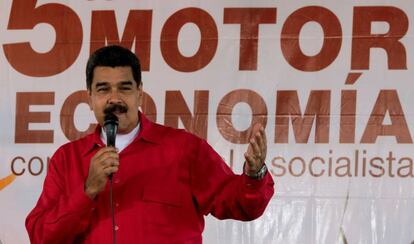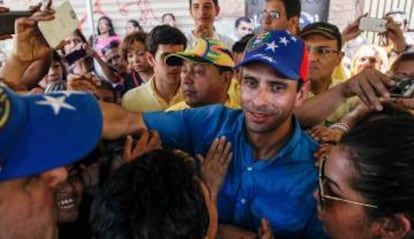Venezuela puts recall referendum on hold
Opposition warns that courts cannot stop the process and that delay tactics only make crisis worse

Five regional courts on Thursday placed new roadblocks on the path of the recall referendum against Venezuela President Nicolás Maduro.
Criminal courts in the states of Apure, Aragua, Bolívar, Carabobo and Monagas have put the referendum on hold while authorities investigate alleged fraud during stage one of the process, which involved obtaining signatures from 1% of the voters in each state and presenting them to the National Electoral Council (CNE).
The government is pushing toward a very dangerous scenario that increases the crisis
Opposition leader Henrique Capriles
The opposition turned in two million signatures in June, but the CNE said that voters had to return to the polling stations to verify their signatures through fingerprint detection.
After overcoming that hurdle, the opposition was getting ready for stage two of the process: securing signatures from 20% of voters in a three-day drive between October 26 and 28.
But now, the entire process is on hold again until further notice. The opposition MUD coalition has accused the government of sabotaging the referendum through delays, obstacles and veiled threats.
National dialogue
In a release, the CNE said it is respecting the decisions by the five courts, and called for “national dialogue as the best democratic formula to preserve the peace and stability of the Republic.”

The decision opens up a dangerous and uncertain period in the already acute political and economic crisis gripping the South American nation.
The recall referendum was being viewed as a last-resort solution to avoid outright confrontation between Venezuelans. Efforts to get the sides sitting down at a table for talks have come to nothing.
And if the political confrontation persists, there is no guarantee of continuity for a process that has the backing of the Union of South American Nations (USAN), whose mission to Venezuela is led by former government heads José Luis Rodríguez Zapatero (Spain), Martín Torrijos (Panama) and Leonel Fernández (Dominican Republic).
Hitting from all sides
Venezuela is in the throes of an unprecedented crisis that is hitting it from all sides: it has the highest inflation rate in the world, violence is rampant, people have trouble finding and buying necessary everyday items, and social fabric is breaking down.
Meanwhile, chavismo is making the most of its hold on the nation’s institutions to delay or freeze the recall referendum against Maduro, who succeeded Hugo Chávez upon the latter’s death in 2013.
According to the Constitution, a recall referendum this year would lead to early presidential elections that surveys suggest the ruling United Socialist Party of Venezuela would lose.
But if the referendum is held next year, the vice-president would take over from Maduro until the next scheduled elections in 2019. The courts’ latest move ensures that Maduro will remain in office for the moment.
This is not the same country as in 2013. This is a different Venezuela where 80% want change Opposition leader Henrique Capriles
Even before the CNE had made its announcement, main opposition leader Henrique Capriles said that the courts “cannot stop the people’s electoral process.”
Later, he tweeted the following message: “We are alerting the diplomatic corps. The government is pushing towards a very dangerous scenario that increases the crisis.”
Then Capriles added a direct message to Maduro and his team: “This is not the same country as in 2013. This is a different Venezuela where 80% want change.”
English version by Susana Urra.
Tu suscripción se está usando en otro dispositivo
¿Quieres añadir otro usuario a tu suscripción?
Si continúas leyendo en este dispositivo, no se podrá leer en el otro.
FlechaTu suscripción se está usando en otro dispositivo y solo puedes acceder a EL PAÍS desde un dispositivo a la vez.
Si quieres compartir tu cuenta, cambia tu suscripción a la modalidad Premium, así podrás añadir otro usuario. Cada uno accederá con su propia cuenta de email, lo que os permitirá personalizar vuestra experiencia en EL PAÍS.
¿Tienes una suscripción de empresa? Accede aquí para contratar más cuentas.
En el caso de no saber quién está usando tu cuenta, te recomendamos cambiar tu contraseña aquí.
Si decides continuar compartiendo tu cuenta, este mensaje se mostrará en tu dispositivo y en el de la otra persona que está usando tu cuenta de forma indefinida, afectando a tu experiencia de lectura. Puedes consultar aquí los términos y condiciones de la suscripción digital.








































